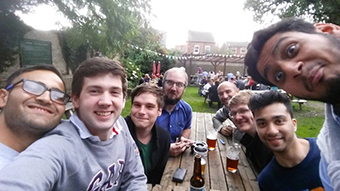
August 24, 2017, by Editor
180 Not Out: The Final Days of University
This blog was written by Stephen Kenny, who has just finished his PhD in the School of Pharmacy.
Doing a PhD is a curious experience. Not quite a student, not quite an employee. Skilled, but not expertly so. Too old to live the traditional student lifestyle, but young enough to still enjoy having more limited responsibilities (having a bit of money helps too). Things change considerably when you approach the end of the allocated time for hand-in. The weekly routine changes and the panic begins to set in. Up to this point the major aim was to apply the scientific method to solving a particular problem. The last few months are all about fulfilling academic requirements. What follows is an attempt to summarise these final stages in the attempted completion of a PhD.
Monkeys on a typewriter
Producing a compendium of your work at sufficient length is the task most postgraduate students dread. I have had colleagues proclaim they would rather ‘chew off their own arm’ than write their thesis. Naturally the thought of compiling the entirety of four years’ toil into a single document is particularly daunting and in actual fact takes several months to complete. Fortunately we are blessed at Nottingham with highly experienced academics that have not only been through the process themselves, but have guided many students through it too. It can be immensely helpful to look through previous theses on similar topics to your own to see how other students presented their work. These can be found on almost any university library website. With such resources available to you, the whole project needn’t be a matter of luck, like the proverbial monkeys producing Shakespeare.
The structure of scientific dissertations is now so well established that the task can be broken down into manageable chunks. If I could offer advice to would-be writers; firstly, give yourself realistic targets for each day. 3-5 pages I found manageable, though this can vary from person to person. I was fortunate enough to have had lots of writing experience, such as on our very own Pharm Life! (N.B. Take any and all opportunities to write at university, it will make the final write-up a heck of a lot easier). Also, ensure you have something to look forward to every day. If the thesis is all you have, you’ll only be motivated by panic. This isn’t healthy for you or your writing. I spent my last months at university playing for the tennis team. Exercise and camaraderie were perfect distractions from the grind.
Speaking Sense
If the thesis is the most time consuming aspect of the PhD, the viva voce is by far the most nerve-wracking. Latin for ‘by word of mouth’, it is essentially an oral thesis defence. After handing in your dissertation, you are quizzed on your understanding of what you have written by an examiner from another university other than your own. They will have been chosen because they have expertise in your field. It is a particular challenge to revise for this as it is almost impossible to predict in advance what the examiner will ask.
In an odd way this exam can be strangely enjoyable as you get to look at your thesis from different angles, approaching your conclusions in ways you may not have thought of whilst writing them. If you are fortuitous enough to pass the viva, the sense of achievement cannot be understated. It doesn’t exist as an ephemeral, adrenaline rush of elation, more a slow burn of satisfaction, a vindication of years of hard work.
It is easier to say from the other side I understand, but I implore any readers not to panic before entering the viva. It is very often the case that if you have been allowed to take the exam, then your work is of sufficient quality to at least attempt a defence.
The Rule of Three
With these tasks now behind you, you are rewarded with the curious honour of being allowed to wear a velvet robe and floppy hat. In any other situation this getup would be rather ridiculous but it fills you with a satisfied sense of achievement to wear the garment and chapeau that other inspiring students have worn before. Unlike on receipt of a bachelor’s degree, there tend to be a lot less of your peers graduating at the same time, so you feel somewhat privileged to graduate as part of a small, select group.
Graduation day is an opportunity to reflect on the years you have now spent at university, how you’ve changed and (hopefully) matured. You remember the friends you’ve made, the places you’ve been and the things you’ve experienced. The sacrifices your family and friends have made for you cannot be underestimated. They will have heard you ranting on everything from the futility of re-attempting failed experiments to how no one in your lab respects the chemical sorting system. My family have now sat through three graduations for me and my brother. They are still doing a very convincing job of feigning enthusiasm.
A PhD is a full- time endeavour when compared to an undergraduate degree. You have had saturated exposure to your friends and colleagues at the end of four years. At this point, they may as well be your family. This in fact was the very premise of the hugely successful sitcom Friends.
Conclusion
Each of the topics I have included could have produced their own separate blog post. In actuality doing a PhD is a very individual journey. Aside from the three major elements described above, there is very little similarity from one student to the next. Each project is as different as each student. What we all have in common is we all went through the same rigorous process. We all survived. Hopefully this will help to persuade others thinking of doing a PhD that it is very manageable and there is nothing to fear from the journey.
Stephen Kenny
No comments yet, fill out a comment to be the first



Leave a Reply